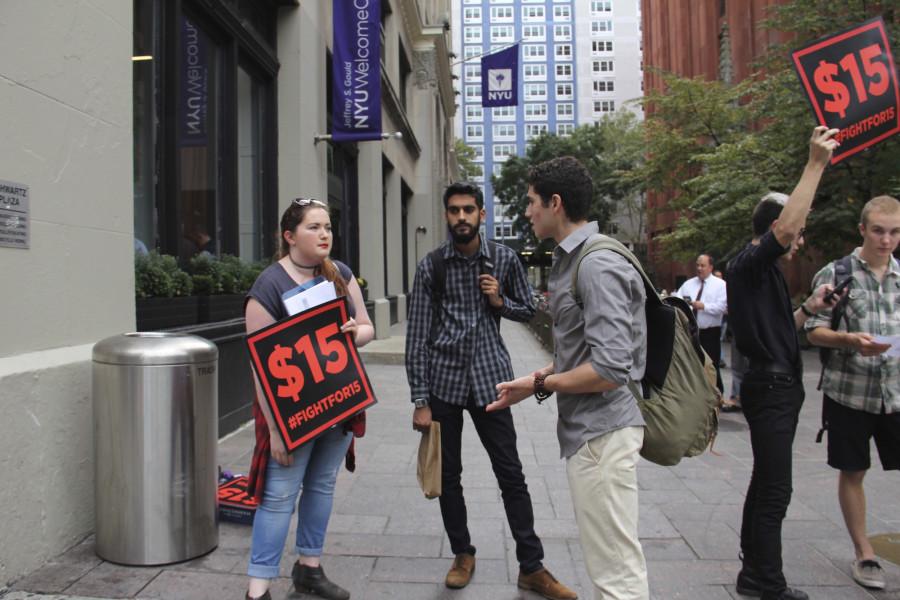Student-workers angry at payroll backup
Haley Quinn (left) and Vishnu Bachani (center) of NYU’s Student Labor Action Movement speak to prospective student Elliot Waxman (right) about raising student worker pay to $15 an hour in front of the NYU Welcome Center on Friday, Oct. 9, 2015.
October 10, 2015
SLAM members called out NYU’s PeopleLink Payroll Department this week for accumulating a student-employee pay backlog due to paperwork issues, culminating in an occupation of the university’s Gould Welcome Center on Friday afternoon.
The group encouraged passersby to support student workers and to send an email to the university in a show of solidarity, calling the university’s behavior toward its students “predatory.”
In the email, the Student Labor Action Movement demands specific dates and times of when student workers are paid; a date when the payroll will resume its normal payment schedule; and a plan from the payroll office for how the problem will be fixed.
“These steps are not meant to compromise the private information of student workers or employers but to create a platform of responsibility and ensured effort in the form of planned action by the NYU Payroll office,” the email reads.
By NYU’s official estimates, there are 50 claims of overdue pay by undergraduates alone. However, university spokesperson Matt Nagel said the university is in the process of clearing many of the issues.
“Overdue pay may be caused by any number of factors that need to be resolved before the pay can be issued,” Nagel said. “Most commonly it is incomplete paperwork or inconsistent documentation on hours worked.”
SLAM organizer and CAS senior Haley Quinn said she is not satisfied with this answer.
“NYU needs to revisit the policies that created the backlog in the first place,” Quinn said. “When we called PeopleLink, they explained that many payments were stalled because of delayed paperwork from supervisors. Paperwork — especially paperwork students have no control over — shouldn’t stop them from getting the money they’ve earned.”
Quinn added that many students rely on these paychecks to meet basic expenses, and that this issue is just another example of the university making itself less accessible to working class students.
Additionally, NYU’s GSOC-UAW Local 2110, the graduate employees union, filed a grievance alleging withholding of employee pay.
Patrick Gallagher, GSOC-UAW’s organizing director, said NYU has yet to disclose the source of the graduate student pay delays. Gallagher also noted that the GSOC-UAW would continue to coordinate with SLAM.
“We have asked them repeatedly to explain what has happened, and they have not acknowledged it in any official capacity,” Gallagher said. “The Local 2110 will support student workers. We consider SLAM to be an ally in the community, and many members will definitely be present for the rally.”
Nagel maintained that despite the confusion, NYU values its word.
“The university takes it as a point of honor that our people are paid what they are owed and they are paid on time,” Nagel said. “When an issue does arise, as it does from time-to-time, we take it seriously and act quickly to resolve it.”
Should NYU continue to withhold employee compensation, it may run afoul of the New York State Legal Code, which could invite more student action and intervention from the Department of Labor.
For now, all parties are focused on achieving their goals and finding equitable solutions. The student-employee wage backlog comes as SLAM gears up its efforts to raise NYU’s student worker pay to $15 an hour, an issue Quinn said she believes is intertwined.
“Ultimately it’s about NYU respecting its student workers,” Quinn said. “Right now not only do we have a situation where NYU isn’t paying student workers enough, but in some cases they’re just not paying them.”
Email Thomas Peracchio at [email protected].
























































































































































